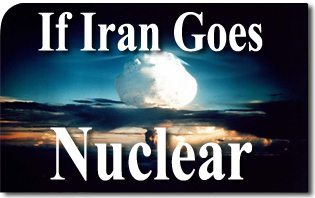 While it seems the United States and Iran have come to preliminary stages for an agreement that would halt Iran’s nuclear bomb program, many ask whether the country twice the size of Texas and dominated by Shia Islam will keep its end of the deal.
While it seems the United States and Iran have come to preliminary stages for an agreement that would halt Iran’s nuclear bomb program, many ask whether the country twice the size of Texas and dominated by Shia Islam will keep its end of the deal.
And why should it?
The threat of a return to sanctions for non-compliance to the agreement is not enough, and neither are red lines. So far, the United States has yet to follow through with its promises of “dire consequences” whether for Russia and the breaking of the Budapest Memorandum on Security Assurance in its involvement in Ukraine or the Assad government using chemical weapons on its own people in Syria.
With no expected consequences for continuing its nuclear program with an eye toward a bomb, and everything to gain from doing so, what is there really to halt Iran, a state funder of terrorism, from acquiring the bomb and effectively holding the Middle East in a death grip of terror? Even as the words of the negotiation were echoing off conference room walls in Switzerland, Iran was sending warships to help Houthi rebels in Yemen.
In fact, according to Iran’s semi-official news agency, Fars, Iranian officials have promised that they will continue their nuclear program.1 They have already developed new centrifuges that would reportedly be able to produce 20% more enriched uranium than the previous iteration.
These “negotiations” seem entirely unilateral in favor of Iran. Apparantly some in the American government are not truly concerned about peace and stability in the already war-torn Middle East.
This lack of concern can be seen most starkly from the disregard for Prime Minister Benjamin Netanyahu’s earnest warnings about an Iran with nuclear weapons. Arguably the country with the most to lose in a Middle East controlled by a nuclear Iran, Israel has warned that it will take measures on its own if the United States does not intervene.
From the one-sided “progress” made in Switzerland, the United States will be forcing Israel to take those steps. Already in turmoil, the Middle East will not be a safe place for a non-Muslim country when Iran eventually acquires the bomb, whether after the terms of the agreement expire or if Iran decides to completely disregard them in the first place. Netanyahu, and Israel, are justifiably apprehensive.
Due to a foolhardy utopian illusion that all men are naturally of good will, Iran will be trusted to keep its promise. Logistically, it is impossible to enact the measures of the agreement. In a country twice the size of Texas, how will inspectors look for nuclear arms or the means to make them? It is obvious that many are counting on Iran’s “good will” and thus naively believe that the Islamic country will not seek the power that would obviously arise from controlling the bomb.
The immediate security of the region and consequentially the world is being sacrificed because of a utopian daydream. If Iran gets the bomb, the world is looking at a situation far worse than when Russia was gaining the technological high ground of world-ending capabilities. Nuclear weapons are not rights; they are calamitous tools with grim responsibilities to be used as deterrents and last resorts. If, and most likely when, Iran gets the bomb, will the United States be able to bring the world back to order as it did at the end of both World War I and World War II, or will there be a world to put back in order?

